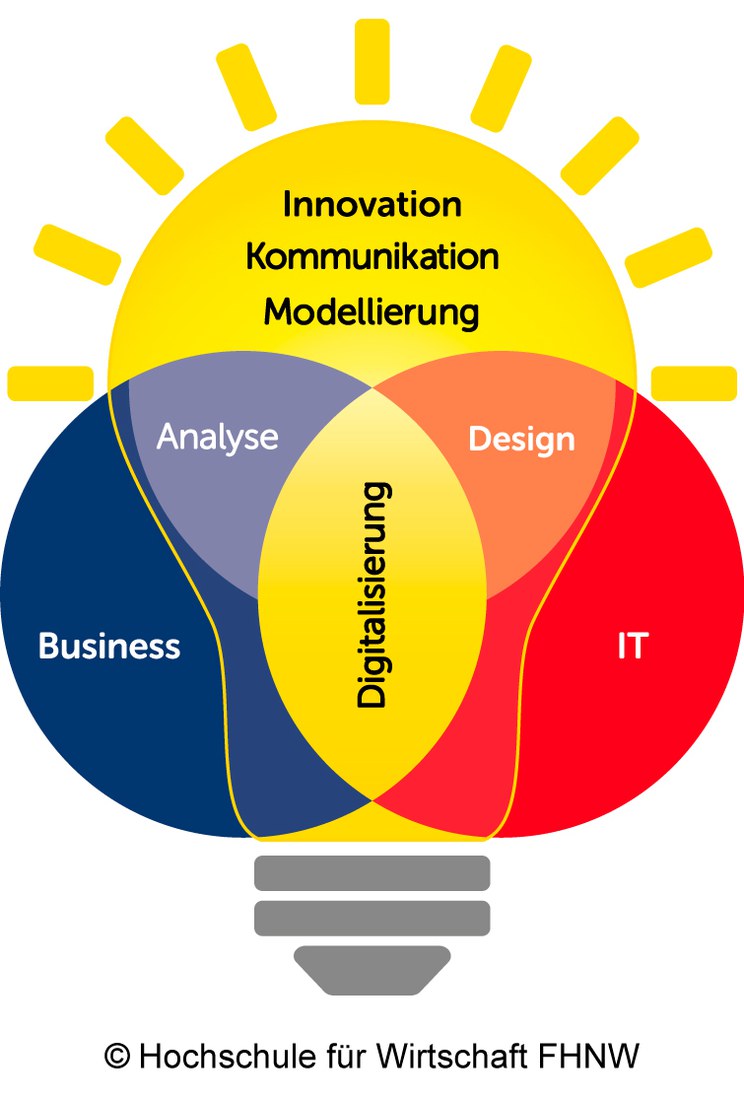My name is Andreas Reber. I am the head of the Business Informatics Bachelor FH program at the FHNW School of Business. I studied computer science at the University of Bern with mathematics and business administration as minor subjects. I then worked in IT at SBB and as a consultant before moving to the then FHSO as a lecturer in 2002.

The Bachelor's degree program in Business Information Technology (BIT) is suitable for anyone who wants to be at the forefront of the digital transformation. Business information technology has always been concerned with the systems that support people in the world of work. Major changes can be expected here now and in the future. Many activities that are still carried out manually today will be automated in the future. What impact this will have on business models remains to be seen. However, we can already see in some sectors that platform economies have emerged (hotel industry, driving services, etc.) that use the technical possibilities of the internet and smart phones for their business models.
The Business Informatics Bachelor's and BIT Bachelor's degree programs are aimed at young people who are interested in new business models and want to help shape innovations. In addition to a certain technical and analytical interest, they should also have communication skills, which will of course be further developed during their studies.
Anyone with a commercial or technical vocational baccalaureate is eligible to study for a Bachelor's degree in Business Informatics. With a baccalaureate, a one-year internship in a commercial or technical environment is also required for the "Business Informatics Bachelor". It is also possible to enter the program from a higher technical college or from a technical business management assistant. A language level of at least B2 is recommended for the English-language Business Information Technology course.

The career opportunities after completing a Bachelor's degree in Business Informatics are very diverse. Many of our graduates find an entry-level job in consulting or project management. But there are also many exciting jobs at the interface between application and application in business analysis. Jobs in big data (e.g. in social media) or IT auditing (e.g. monitoring the correct use of financial systems) are increasingly coming onto the market.
In addition, the shift of business transactions to the cloud also leads to new security threats. The secure operation of all systems and platforms that a company needs to function is becoming increasingly important and is also leading to the creation of interesting new jobs. Also for people with a Bachelor's degree in Business Informatics.
There are many exciting developments in the field of artificial intelligence (machine learning, modeling, pattern recognition, e.g. in customer behavior, chatbots, forecasts, etc.). Our students learn the necessary basics to actively and competently advise or participate in these areas.
And last but not least, there is also the opportunity to become self-employed with an idea for an innovative app or web application after completing the "Business Informatics Bachelor".

Information Systems is a generalist course of study at the interface between business and computer science. The discipline has existed for over 40 years. The modules of the "Business Informatics Bachelor" are equally weighted in the module groups Fundamentals, Business Administration, Computer Science and Business Informatics. The specialization is added in the final year of study. Students studying for a Bachelor's degree in Business Information Systems choose between Software Engineering[RG1] g Leadership (more technically oriented), Business Analytics (more mathematically/analytically oriented) and Digital Business Management (more management-oriented). An important part of a university degree course is also the student work, which is carried out together with practice partners.
The Business Informatics Bachelor's degree program is highly self-directed. Only about a third of the time spent on a module is spent in classroom teaching. Great emphasis is placed on practical problems, whether in the form of current case studies or project work. This has the great advantage that it is not only part-time students who establish a direct link to practice, allowing exciting discussions to take place in class and in group work. In the "Business Informatics Bachelor" full-time course, lessons take place on campus on weekdays for six half-days. In the "Business Informatics Bachelor" part-time course, there are four half-days, some of which are also offered in the evening or on Saturday mornings.

Preparation for the lecture is essential when studying for a Bachelor's degree in Information Systems. This is the only way to ensure exciting, interactive lessons in which the participants' experiences can also be incorporated. With the experience gained from online teaching, there is an even greater shift from theory lessons to self-study, so that the time spent together can be used even more for working on practical issues in groups.
Due to the relatively small groups of 25 to 50 students, individual support from the lecturers is guaranteed in the "Business Informatics Bachelor" course. Tutorials are also offered in certain modules and in many cases students organize themselves into study groups.
In many cases, online learning assessments in the form of short tests are offered for the "Business Informatics Bachelor". There are also modules in which parts of the final module grade are worked on during the semester, e.g. in the form of papers and presentations.
The semester fees for a Bachelor's degree in Business Information Systems amount to CHF 700, plus a registration fee (CHF 200) and a diploma fee (CHF 300). In addition, certain teaching materials must also be purchased (maximum CHF 500 per year).

The FHNW School of Business has modern new campus buildings at all its locations (Olten, Brugg-Windisch and Basel). It also has an attractive sports program. The possibility of a semester abroad (without extending your studies) should also be taken into account when deciding on a university for the "Business Informatics Bachelor". The university has exchange agreements with over 170 universities around the world. In addition, numerous international projects are offered, which enable students to network internationally even without a semester abroad.
The campus of the FHNW School of Business is very close to the train station at all three locations. This means that the "Business Informatics Bachelor" course can be completed centrally.
In addition to the modern buildings and the opportunity to spend a semester abroad, the high level of practical relevance and the lecturers' extensive networks in the business world are decisive criteria. The many elective options in the Bachelor of Business Informatics course and in particular the new specializations make the course very attractive.

Participants benefit most when they actively take part in the lessons. This can lead to lively and sometimes controversial discussions on the Bachelor of Business Informatics course. In the higher semesters in particular, the proportion of practical relevance and content to be worked on independently increases, making lecturers more learning coaches and less input providers.
We lecturers enjoy working with young people and it gives meaning to our work. The younger generation is preparing for a future that none of us can predict in detail. What is certain, however, is that there will be companies that use new technology in order to remain competitive and continue to develop. Students of Business Informatics and Business Information Technology are preparing specifically for this future. In addition to the German-language "Business Information Technology Bachelor" course, the preparation for an international, intercultural environment in the English-language BIT course should not be underestimated.
In many modules, written final module examinations take place at the end of the semester in the "Business Informatics Bachelor" course. In some modules, however, this does not count 100%, but is offset against achievements during the semester. However, there are also modules that are completed with a written paper, a project or a presentation.
Provider of degree programs "Business Informatics Bachelor (FH)"